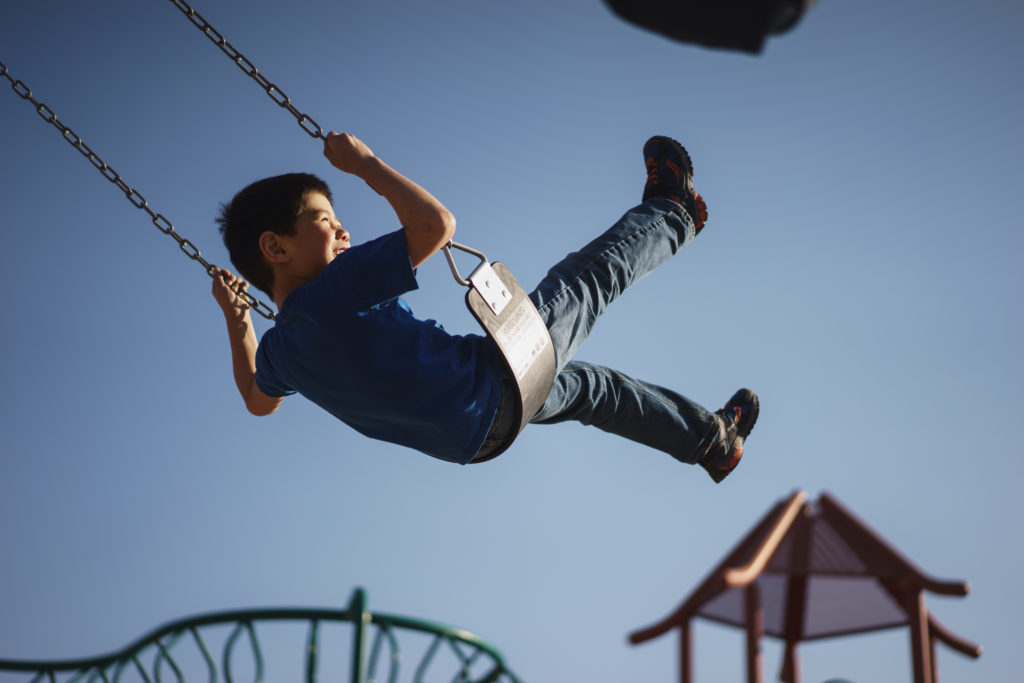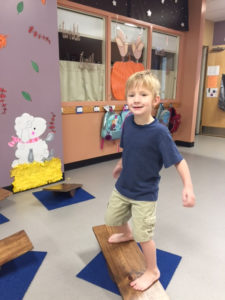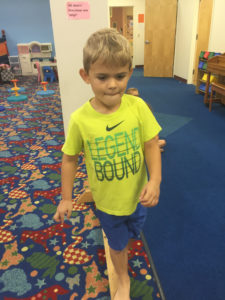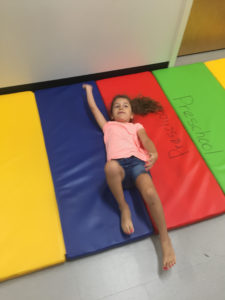
If you have visited Faith Christian Preschool or Elementary School in the mornings, you may have wondered why our students roll across mats or walk on a balance beam in the halls. Minds in Motion is composed of activities to stimulate the brain through auditory, sensory, and visual processing and motor skills. These activities also directly impact the vestibular system (balance and movement) and the proprioceptive system (the body’s ability to process position, weight, pressure, movement, etc.) Our students perform these activities each morning to help them wake up their minds, bodies and senses.

Why is this important for our students?
The proprioceptive system influences a child’s ability to exert the proper amount of pressure when learning to write or color and helps them coordinate movements such as carrying or moving their backpack. This system also allows a child to gauge the amount of force acceptable when playing tag with their friends or holding something delicate in their hand.
The vestibular system, on the other hand, allows the students to take the information received through their senses to create awareness within the space around them. For example, their eyes would see where they are in the room and the vestibular system would tell them if they are moving or standing still and if they are balanced. All of this information is received and processed in the brain, which stimulates responses such as arousal, safety, motor, language, survival, and attention. Children with an underdeveloped vestibular system often perform poorly on assessments of learning or behavior because they are incorrectly processing their senses. This sensory processing issue can lead to feeling unsafe, which causes them to respond incorrectly to stimuli.
Another mainstay of Minds in Motion is the crossing of the midline. Many activities include portions where students have to cross the center of their bodies with their arms or legs. This helps brain coordination and can lead to better reading and writing abilities in the long-term.

Many teachers at FCS have noticed the impact of consistent use of Minds in Motion activities.
“M.I.M. has such an impact on these kiddos. Their coordination and overall attention span is greatly improved just after a couple of months. I don’t think I would ever consider doing without it!”
-Ms. Holly White K4 Lamb Teacher
“Benefits include:
- Increased ability to focus.
- Printing of name – children are able to see and comprehend better the lines/space on the paper to print their name.
- Coordination of body parts
- Increased ability to process pre-reading skills
- Visual discrimination
- Differentiate between letter/numeral symbols and sounds
- Increased ability to follow directions to complete at task.”
-Mrs. Tina Ewing, K3/K4 Chick Teacher
Minds in Motion activities don’t have to be limited to the school day. You can easily do many of these activities with your child at home. Below, you will find 4 activities you can do with your child in various locations.
- Try making your own balance beam. Make a balance beam at home using a board or pool noodle cut in half.
- Encourage your child to step from one large stone or tree stump to another to increase their balance. Watch as your child attempts to climb onto a large rock or up a small tree to develop their core strength, hand/eye coordination and balance.
- Help your child to climb up the slide. This can help to build core strength, balance, and risk assessment.
- Go “old-school”. Rolling down a hill or doing somersaults provides pressure and movement to strengthen both the proprioceptive and vestibular systems.
These activities, when performed consistently, work to develop a child’s sense of balance, coordination, movement, and reflexes to better prepare them for their future.
By: Mrs. Nycole Sinks
Advanced K4 Teacher, Faith Christian School
References:
Greutman, Heather..”How the Vestibular System Affects Your Child’s Behavior”
Hanscom, Angela. ” THE UNSAFE CHILD: Less Outdoor Play is Causing More Harm than Good”
 Christian School
Christian School 